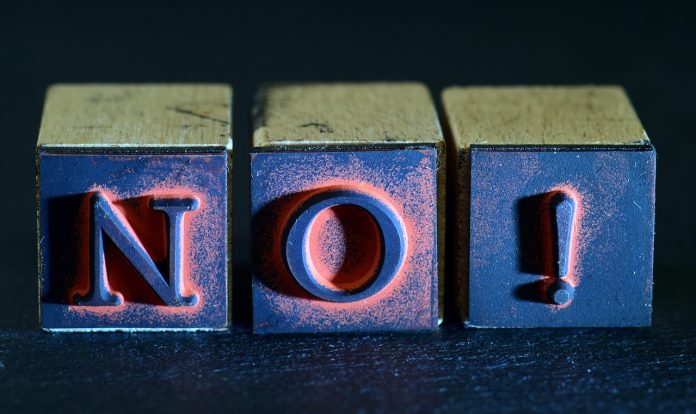If you’re running a business, you are probably pretty familiar with the word “No”. No matter how great your service and products might be, rejection is one of those things that most entrepreneurs and business owners get on a regular basis. What’s even more interesting is that, the more successful your business gets, the more rejection and dislikes you also get.
As much as we like to hear positive affirmations all the time, there are successful entrepreneurs who believe that the word “No” is actually one of those necessary evils that is actually good for your business.
Not everyone agrees with this, but something happened recently to me that made me agree that “no” from customers is actually an essential component in running a successful business.
Someone had reached out to me recently. He sells insurance and he was very enthusiastic about helping me. He asked if we can schedule a time for him to take a look at how he can give me great home insurance. This is fantastic considering he was coming from a value-add perspective.
We started on the right foot. As our conversation progressed, though, I noticed he was talking about aspects of his offerings that I didn’t really care about. He spent a lot of time on them. Every now and then he stopped, looked up, and asked me things like, “Does this sound good to you?” or “Are you with me on this?”. And even though I wasn’t really feeling it, I said “Sure” or “Yes”, because I didn’t feel like he would necessarily listen if I had said “No”.
When it came for him to close the sale, I simply said “No, thanks”.
He looked at me like I was an alien who came from outer space. He stormed out and I never heard from him again.
I couldn’t blame him for his reaction. But I also couldn’t help but wonder what would happen if I had stopped him on his tracks earlier in the conversation and said “no” to some of his offerings. His fatal mistake was never really identifying my needs or wants. If he had just asked me better questions and found particular pain points that I cared about, he probably would’ve secured the account.
Except he didn’t.
This begs the question: are we constantly just looking for all the affirmations from ‘happy’ customers, and subconsciously ignoring what could be the most important feedback for our business?
Better yet, are we asking in a way that we uncover their real “No”, so that we can improve our business?
Feedback is King
It’s no secret that good market research can cost an arm and a leg. It’s one thing to send out a survey and read incoming feedback and put them in your file somewhere. It’s another thing when business owners are on the outbound constantly collecting market feedback. Not only is it hard work, it also takes extremely precious time away from running your business.
And yet, without good market feedback, your only measure of your performance is your sales—which indicates how well you’re doing now, but not necessarily how well you will be doing in a few months, or a few years’ time.
There are many contributing factors to future success, but we aren’t usually aware of problem areas that could become a real issue, unless our customers tell us. This is the reason why general managers of restaurants always go around the floor and ask things like, “How’s everything going for you?”. My answer to this is typically “great!” even if it’s not really an earth-shattering experience.
Good business owners would tastefully prod their customers with better questions that have a 1-2-punch structure:
1) They’d briefly introduce themselves to us and then ask specific questions like “What about this program is to your liking?” This keeps them from falling into the trap of asking big overarching questions that doesn’t always reveal true feedback.
2) Then they may close with yet another calibrated, yet specific question like, “How else could we have improved your dining experience?”
Asking the right question makes a big difference in getting specific, measurable, and actionable feedback.
No now is better than no later
Many of us who have spent some time with a future client knows how expensive it can get to only to be told no at the end. Once, I spent close to 100 hours on a client and the client told me that he couldn’t move forward. Just imagine who else I could’ve helped with my services during that time.
I really wished they had told me “no” sooner.
From that experience, I learned that there are multiple types of no.
1) No to now. Sometimes your amazing offering just doesn’t fit their need. This is important to discover because your offering is meant for a certain audience. Talking to the wrong audience who do not need it then, or ever, only tells you that you should move on and focus on those who would buy from you.
2) No to the services or product. This is always good to hear because then you can find out ways to improve it. I consider this to be a goldmine. Sometimes, as business owners, we can get so wrapped up in our business that we are oblivious to the real problems.
3) No to the experience. Sometimes it’s not about the offerings at all. Sometimes it’s about the way it’s offered, the positioning, and what it means for them to buy it. Other times, it might even be a no to the deliverer. This is why it’s crucial to determine your brand voice, your messaging, and how you’d like your company to be perceived in the marketplace. Determining this in the early days of your business will save you from hours of painstaking remedy, or worse, closure in the future.
No is a trustworthy way to get to Yes
Your customers are people. People like to have a say. And having a say more often than not means being able to say no repeatedly.
Just think about your family. Your kids probably say no to you more times than they ever say yes. And yet, they trust you implicitly. Your spouse would definitely be the one to call you out on your mistakes and what they’d disagree with. This means that no is a common, or even a necessary component to building trust.
If your customers don’t feel like they can say no, or complain, or point things out to you that you may not like to hear, you have yet to earn their trust.
And your relationship with your customer will only get weaker if all you are willing to hear is a yes.
Stratospheric success is often built on a mountain of rejection
It’s no secret that successes are built on failures and rejection. Here are just some examples:
1) Sir James Dyson took 15 years, all his savings, and 5,126 failed prototypes before he became the household name for vacuum cleaners.
2) Akio Morita, founder of Sony’s first product was a rice cooker that burned rice instead of cooking it.
3) Ariana Huffington’s second book was rejected by 36 publishers before she launched the successful media company that is now known as The Huffington Post.
4) Tim Ferris was turned down by 25 publishers before finding one who was willing to publish his best-selling book “The 4-Hour Workweek”.
5) Colonel Sanders started at age 65 and was rejected 1009 times before a restaurant agreed to sell his chicken.
I’m not sure if there are too many stories of how someone became an overnight success, because if you really look more closely, overnight might simply mean years worth of hard work.
The next time someone say “no” to you, it’s your chance to dig into the goldmine and find out why they’re saying “no”.
Find a Home-Based Business to Start-Up >>> Hundreds of Business Listings.

















































